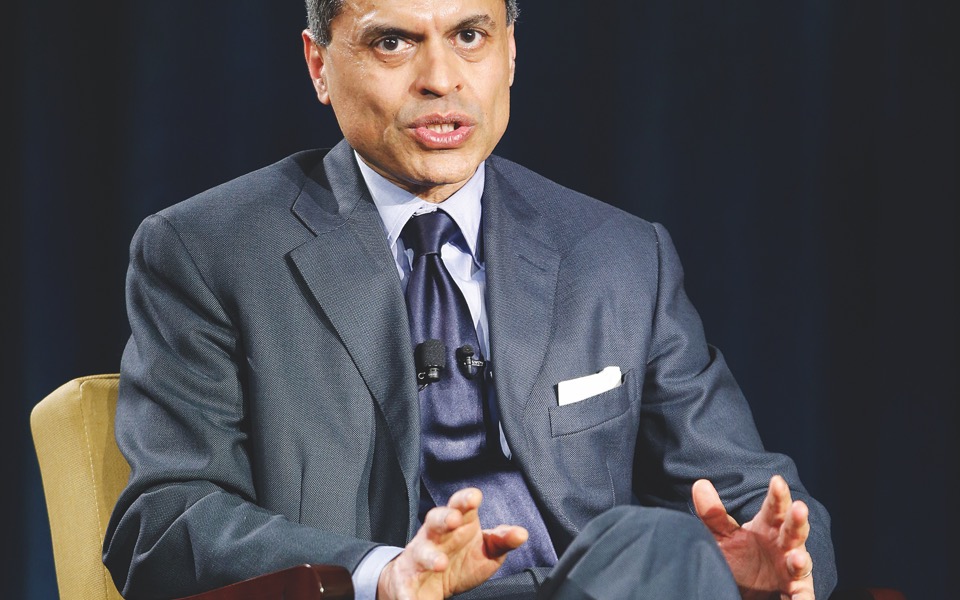‘Biden has exceeded everyone’s expectations’
Veteran CNN journalist and Washington Post columnist speaks to Kathimerini on the occasion of his recent book

Though widely known for his sense of realism and moderation, Fareed Zakaria displays a sense of cautious optimism. In his new book “Ten Lessons for a Post-Pandemic World,” the veteran CNN journalist and Washington Post columnist explores the crucial crossroads that humanity finds itself at as it struggles to turn the sinister page of the pandemic. At this moment, Zakaria finds a unique opportunity for a radical reassessment of global priorities.
“I went from barely recognizing the country that had welcomed me as an immigrant, when Trump was soaring, to seeing the open and generous version of the US I had known reaffirmed,” notes the Indian-American analyst, adding that he expects this change in direction to have a significant impact on the world and its future trajectory. In an interview with Kathimerini, Zakaria shared his positive assessment of Joe Biden’s first 100 days in office, explained his thoughts on Europe’s resilience, and talked about his concerns about the biggest challenges of the brave, new, post-pandemic world.
Between a low bar set by Trump and a low-energy campaign by the Democrats, expectations for a Biden presidency were hard to define. After his first 100 days in office, have your expectations been met or exceeded?
I think Biden has exceeded everyone’s expectations. He was this cautious, liberal Democrat, who had always been sensitive to where the party and the currents of the country were, usually placing himself just left of center. He ran a “pandemic” campaign, without roaring crowds. But if one had looked at the campaign literature and promises, I think there was a premonition of what was to come.
I think Biden represents a culmination of the frustration and idealism of the American Left, which seeks to find ways to use the government to address some of the big problems that have developed over the last 40 years. The age of Reagan and Thatcher brought a lot of benefits, among them freeing up enterprises. But the most sensible people would admit it also produced a number of problems: rising inequality, the hollowing out of a blue-collar middle class – and perhaps most insidiously, the creation of a self-perpetuating meritocracy, where people were chosen on merit but were then able to game the system, leaving behind the traditional working class. I think Biden became the receptacle for all of this willingness for change. It would be wrong to think he dreamed it all up, but he has already been executing it very well.
Here I believe there is here a similarity to Roosevelt, who was also not a social theorist or an ideological believer of Keynesianism. He came into office and tried to balance the budget. But he was a pragmatist who knew how to get things done. With Biden, we have a combination of the Left’s idealism and energy, combined with his pragmatism and ability to understand how to get things done. And so far, we have what you could argue is the most successful 100 days of a US president certainly since Reagan, and in some ways probably since Lyndon Johnson.
One of the intangible, but lasting impacts of the Trump presidency was an increasingly divided and polarized American society. Are you already seeing a decline in political radicalization in Biden’s America?
I think Biden is trying to mend those wounds. There’s no question he has had some effect by showing that competence, moral tone, and leadership matters. But America remains a very polarized society. The roots of these divisions are quite deep and relate to culture, class and religion in a way that is very difficult to turn around just by having a nice guy in office.
A very revealing poll was taken a couple of weeks ago, that asked Republican voters what the goal of the Republican Party should be: to propose good legislation, or to prevent the imminent destruction of American civilization? Twenty-five percent chose the first, 50% chose the latter. So the Republican Party is gripped by an apocalyptic millenarianism, which believes that we stand on the threshold of the decline of everything we’ve ever known. Another motivator is a very deep class resentment among the rural less educated population, against the urban and often more educated elite. These are difficult divides to bridge over. Unfortunately, in America today, I feel that we are still behaving more like the Sunnis and Shias of the Middle East that I spent the last 25 years analyzing. I think Biden can have a significant effect, but it’s probably on the margins and rather early to tell.
What we have already seen, however, is a number of foreign policy landmarks. The recognition of the Armenian genocide, the withdrawal of troops from Afghanistan, the bullish statements against Putin and China – they all seem to signal that the US is more active internationally. Can we start defining what the Biden foreign policy doctrine looks like?
I think you have highlighted its outlines. The US is now much more actively and energetically trying to pursue – not just its interests – but its values. And that doesn’t come from the Democratic Party, but from the tradition of American foreign policy that has been broadly bipartisan for the last 70 years: an engaged America that tries to be the spokesperson for an open, rules-based, international order. On some episodic issues like the Armenian genocide, you definitely see some movement. Remember this was a campaign promise by the Democrats for the last 20 years – Biden actually kept it.
Beyond that, though, I think we have not yet seen a very clear Biden foreign policy. I think he is prioritizing, trying to keep the world at bay while taking care of big domestic things. If you listen to his rhetoric, he believes that if America can invest in itself and demonstrate competence, this may count more with the Russias and Chinas of the world, compared to confrontational foreign policy. The central lesson I myself have taken from the Cold War is that often “being” was more important than “doing.” Being strong, successful and a flourishing capitalist democracy was more important than doing interventions in Vietnam, in Central America, in Angola. Those ultimately proved to be dead ends. What wore the Soviet Union out, eventually, was the indisputable fact of American dynamism and strength. I think this reflects Biden’s priority, which is a search for the rebuilding of the basis of American power rather than the manipulation of foreign events or countries to successfully create better coalitions around the world.
‘Europe cannot be a single, unitary actor in the geopolitical space’
In your book “Ten Lessons for a Post-Pandemic World” you talk about how Covid-19 could be a catalyst for redefined global policies on growth, inequality and climate. As some countries in the West are starting to emerge from the pandemic’s darkest hour, do you see us actually heading in that direction?
There is a fitting saying: Nobody fixes the roof when the sun is shining. If you look at points where countries made serious reforms – you know this very well in the Greek case – it’s when things are really bad. The pandemic has dislocated all of us. It has forced us to reconsider how we work, how we live, how often we go to the office or travel. And it has also caused us to ask the crucial question: If the government can help in these circumstances, can it help in others? And what would be the wisest way to do it?
If Biden gets even half of his infrastructure and stimulus bills done he will spend 4 to 5 trillion dollars, most of it investing in the bottom half of the economic scale. In my lifetime of following American politics ever since I came here in 1982, every major fiscal effort by the federal government has been either tax cuts for the rich or wars. This is the first significant fiscal exercise whose majority of benefits will be investment for the long term or support for poor and lower middle class people.
And Republicans don’t have a very strong argument against it. Some say it may trigger too much debt – but I don’t remember the same complaints in the 50 years of tax cuts which expanded the deficit. In ideological terms, the debate has been very interesting: You are noticing that the more activist side of this equation is on the offense, and the austerity side is on the defense. I would argue the same thing is happening in Europe. Draghi’s view in Europe used to be an outlier, now it’s mainstream. So I think there’s a real opportunity for a recognition that long-term, inclusive sustainable growth can only come if the government plays a vital role in assisting a market economy. I think we’re ideologically there, and we’re getting there in policy terms as well.
I’m glad you mentioned Europe, because you also use it as a vehicle for one of the central arguments in your book. You suggest that the pandemic has already led to a more interconnected Europe, and may continue to do so. What led you to this assessment?
Europeans sometimes forget how historical the EU is as an achievement. France and Germany went to war three times between 1879 and 1945 – and twice they dragged the whole world in. It is extraordinary that, today, Europe has achieved a pooling of sovereignty for which there is no historical precedent of any scale. For the last 30 years, every time there is a crisis people confidently predict the end of the eurozone or of European cooperation. But what always ends up happening in the long run is a reassertion of an enlightened self-interest that considers the solution to be more Europe, not less.
In the pandemic, for example, you saw signs of petty nationalism: closing of borders, vaccine export controls. But look at where it fundamentally led: For the first time France and Germany are guaranteeing the debt of all EU countries – something they had been unwilling to do during the crisis of 2008-09. I think that’s just how the EU progresses. It always looks like it’s collapsing, but if you travel 10 or 20 years ago you realize that it’s always becoming deeper and stronger.
And yet, as you argue in your book, we are now in a bipolar world with the US and China as the dominant forces. Europe does enjoy relative power – mostly regulatory – but could it ever challenge these two to a more tripolar order?
The reason I call it a bipolar world is because the US and China are in a league of their own. The US is the biggest economy in the world, and China is second but also larger than the third, fourth, fifth and sixth economies combined. The same applies for defense budgets: These two powers tower above the rest. That is because of one fundamental premise I hold, which I think I’m right about: Europe cannot be a single, unitary actor in the geopolitical space.
If it were to be, then it would certainly be a tripolar world. You raised the one area where Europe’s power does matter, creating a strange tripolar world: the regulation of tech, trade rules, and things like intellectual property tax regimes. There, Europe is very powerful because it speaks with one voice. Where the EU could also play a useful role is in checking the US in areas where it’s being hypocritical or applying double standards – things like tariffs or human rights issues globally.
But on geopolitical issues it remains fractured: It does not, and will not speak with one voice. Those who want it to, I believe, are asking for too much. These countries have been sovereign nations for a long time, with deep traditions of statecraft and a rooted sense of national interest. Emmanuel Macron is not going to subcontract his foreign policy to a bureaucrat in Brussels, neither is Angela Merkel, or Kyriakos Mitsotakis.
In this bipolar post-pandemic world, you present two possible scenarios: one where the US and China find themselves locked into ever-ascending competitive spirals, and one of healthy competition and cooperation. Is the West in a position to trust China? One and a half years after the outbreak of the virus in Wuhan, the investigation into its origins remains extremely murky.
There’s no question that the goal must be the integration of China into an open rules-based system. This requires a very different behavior, a country that is more transparent and less neuralgic about its phobias. Look at the way it is now trying to hold the economic relationship with Australia hostage, demanding that Australian think tanks should not criticize the Chinese government. These are behaviors we have to ensure do not get ratified by the international system, and do not infect it.
But China is a very different country, a very different political system, and a very different civilization – and is also internally obsessed. The conversion of China is, to me, a foolish task to undertake, one that would wreck the international order. The moderation of Chinese behavior to make it compatible with an open rules-based system seems to be the right goal and to do that we can use the usual mixture of inducement and potential punishments, of carrots and sticks. The key is how to navigate the space of integrating China by asking for it to moderate its behavior without trying to convert it. This, for me, is the central challenge that the West faces.
Inequalities
The rise of global inequality is, without question, one of the biggest negative consequences of the pandemic. Not only because some countries are going to enter the post-pandemic world while others are still mired in the pandemic; but also because some will be able to spend their way out of the pandemic, and others will not. Do you really see this universality of experience leading to a less unequal world?
I’m cautiously optimistic. On vaccine nationalism, after the initial selfishness, we already see some countries donating large numbers of jabs, like the US providing them to Mexico and India. In a paradoxical way, I’m also hopeful about the question of the larger economic relief, exactly because it’s a problem happening everywhere. Its scale is so large that if the global community doesn’t engage in debt forgiveness, the whole global economy is going to shut down, affecting countries like the US. At the end of the day I also have a temperamental optimism. This is probably the first event of my lifetime where everybody on the planet simultaneously experienced the same thing, the very same dislocation. The global financial crisis didn’t affect most countries that were not part of the Western sophisticated financial system. This time, everybody in the world has been affected by the pandemic. From this common experience, I think, will come some understanding of our common humanity.






